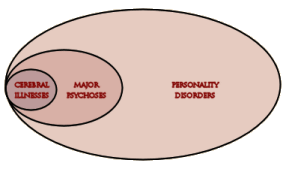-
the specific mental mechanisms hypothesized by either Freud or Meyer.
-
the fact that these illnesses were acquired conditions, not caused by biology.

In both the DSM and the DSM-II, these psychological formulations from Meyer and Freud were used to explain illnesses in the group Jaspers called Personality Disorders [“variations of human nature”] – by which he meant illnesses acquired in life. We know that they eliminated the psychobiological and the psychoanalytic explanations because they were unproved [and unprovable] hypotheses, but did they also think that these conditions were not acquired? did they think they were biological? or did they think we just didn’t know which? Insofar as I know, they didn’t say either way. Now flash forward several decades to the early days of the DSM-V. The people who would ultimately be in charge of the DSM-V revision of the diagnostic manual began meeting in 1999, and in 2002 published a book about what they had in mind [A Research Agenda for DSM-V: edited by David J. Kupfer, Michael B. First, and Darrel A. Regier]:
The DSM-III diagnostic system adopted a so-called neo-Kraepelinian approach to diagnosis. This approach avoided organizing a diagnostic system around hypothetical but unproven theories about etiology in favor of a descriptive approach, in which disorders were characterized in terms of symptoms that could be elicited by patient report, direct observation, and measurement. The major advantage of adopting a descriptive classification was its improved reliability over prior classification systems using nonoperationalized definitions of disorders based on unproved etiological assumptions. From the outset, however, it was recognized that the primary strength of a descriptive approach was its ability to improve communication among clinicians and researchers, not its established validity…
In the more than 30 years since the introduction of the Feighner criteria by Robins and Guze, which eventually led to DSM-III, the goal of validating these syndromes and discovering common etiologies has remained elusive. Despite many proposed candidates, not one laboratory marker has been found to be specific in identifying any of the DSM-defined syndromes. Epidemiologic and clinical studies have shown extremely high rates of comorbidities among the disorders, undermining the hypothesis that the syndromes represent distinct etiologies. Furthermore, epidemiologic studies have shown a high degree of short-term diagnostic instability for many disorders. With regard to treatment, lack of treatment specificity is the rule rather than the exception.The efficacy of many psychotropic medications cuts across the DSM- defined categories. For example, the selective serotonin reuptake inhibitors [SSRIs] have been demonstrated to be efficacious in a wide variety of disorders, described in many different sections of DSM, including major depressive disorder, panic disorder, obsessive-compulsive disorder, dysthymic disorder, bulimia nervosa, social anxiety disorder, posttraumatic stress disorder, generalized anxiety disorder, hypochondriasis, body dysmorphic disorder, and borderline personality disorder. Results of twin studies have also contradicted the DSM assumption that separate syndromes have a different underlying genetic basis. For example, twin studies have shown that generalized anxiety disorder and major depressive disorder may share genetic risk factors.
Concerns have also been raised that researchers’ slavish adoption of DSM-IV definitions may have hindered research in the etiology of mental disorders. Few question the value of having a well-described, well-operationalized, and universally accepted diagnostic system to facilitate diagnostic comparisons across studies and to improve diagnostic reliability. However, reification of DSM-IV entities, to the point that they are considered to be equivalent to diseases, is more likely to obscure than to elucidate research findings.
All these limitations in the current diagnostic paradigm suggest that research exclusively focused on refining the DSM-defined syndromes may never be successful in uncovering their underlying etiologies. For that to happen, an as yet unknown paradigm shift may need to occur. Therefore, another important goal of this volume is to transcend the limitations of the current DSM paradigm and to encourage a research agenda that goes beyond our current ways of thinking to attempt to integrate information from a wide variety of sources and technologies…
The argument within psychiatry framed as it was thirty plus years ago as psychoanalysis versus biological psychiatry is anachronistic at this point. This is about a rational and productive classification of mental disorders. Modern APA directed psychiatry is as ideologically driven as the psychoanalytically dominated APA of the now distant past. The DSM-III claimed to classify all mental illness and that was only justified by two things: etiological neutrality and proven reliability. It wasn’t what anyone wanted, but it was apparently the best compromise for that time. The subsequent revisions each had strengths and weaknesses but stayed on the same highway. As you can read in the little vignette above, and in spades if you read the whole book, the DSM-V [DSM-5] aimed for a biologically based diagnostic scheme for everything – abandoning etiological neutrality without a blink, with barely any mention. It’s not a question of throwing out Freud and Meyer this time, it’s throwing any and all acquired psychological mental illness altogether, with a new DSM-5 definition of mental disorder: "a behavioral or psychological syndrome that reflects an underlying psychobiological dysfunction."
Sorry, the comment form is closed at this time.